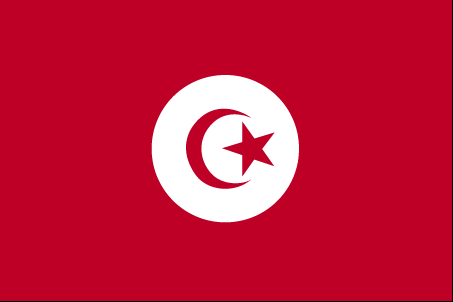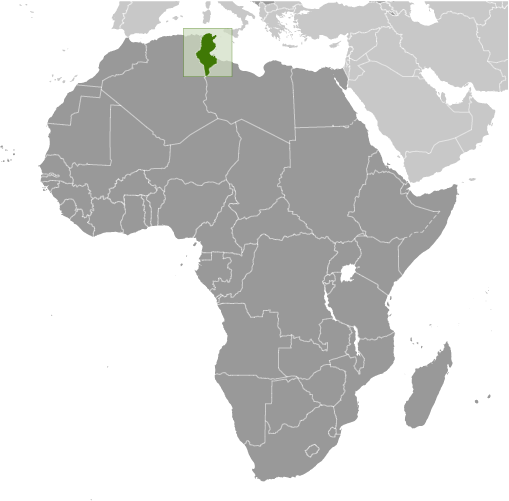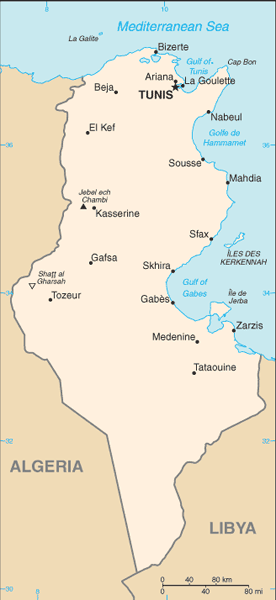Rivalry between French and Italian interests in Tunisia culminated in a French invasion in 1881 and the creation of a protectorate. Agitation for independence in the decades following World War I was finally successful in getting the French to recognize Tunisia as an independent state in 1956. The country's first president, Habib BOURGUIBA, established a strict one-party state. He dominated the country for 31 years, repressing Islamic fundamentalism and establishing rights for women unmatched by any other Arab nation. In November 1987, BOURGUIBA was removed from office and replaced by Zine el Abidine BEN ALI in a bloodless coup. BEN ALI is currently serving his fifth consecutive five-year term as president. Tunisia has long taken a moderate, non-aligned stance in its foreign relations. Domestically, it has sought to defuse rising pressure for a more open political society.
Country Name
Conventional long form:Tunisian Republic
Conventional short form:Tunisia
Local long form:Al Jumhuriyah at Tunisiyah
Local short form:Tunis
Government Type
republic
Capital
Name:Tunis
Geographic coordinates:36 48 N, 10 11 E
Time difference:UTC+1 (6 hours ahead of Washington, DC during Standard Time)
Administrative divisions
24 governorates; Ariana (Aryanah), Beja (Bajah), Ben Arous (Bin 'Arus), Bizerte (Banzart), Gabes (Qabis), Gafsa (Qafsah), Jendouba (Jundubah), Kairouan (Al Qayrawan), Kasserine (Al Qasrayn), Kebili (Qibili), Kef (Al Kaf), Mahdia (Al Mahdiyah), Manouba (Manubah), Medenine (Madanin), Monastir (Al Munastir), Nabeul (Nabul), Sfax (Safaqis), Sidi Bou Zid (Sidi Bu Zayd), Siliana (Silyanah), Sousse (Susah), Tataouine (Tatawin), Tozeur (Tawzar), Tunis, Zaghouan (Zaghwan)
Independence
20 March 1956 (from France)
National Holiday
Independence Day, 20 March (1956); also the anniversary of BEN ALI's assumption of the presidency, 7 November (1987)
Constitution
1 June 1959; amended 1988, 2002
Legal system
based on French civil law system and Islamic law; some judicial review of legislative acts in the Supreme Court in joint session; has not accepted compulsory ICJ jurisdiction
Suffrage
18 years of age; universal except for active government security forces (including the police and the military), people with mental disabilities, people who have served more than three months in prison (criminal cases only), and people given a suspended sentence of more than six months
Executive branch
Chief of state:President Zine el Abidine BEN ALI (since 7 November 1987)
Head of government:Prime Minister Mohamed GHANNOUCHI (since 17 November 1999)
Cabinet:Council of Ministers appointed by the president
(For more information visit the World Leaders website)
Elections:president elected by popular vote for a five-year term (no term limits); election last held on 25 October 2009 (next to be held in October 2014); prime minister appointed by the president
Election results:President Zine El Abidine BEN ALI reelected for a fifth term; percent of vote - Zine El Abidine BEN ALI 89.6%, Mohamed BOUCHIHA 5%, Ahmed INOUBLI 3.8%, Ahmed BRAHIM 1.6%; voter turnout 89.4%
Legislative branch
bicameral system consists of the Chamber of Advisors (126 seats; 85 members elected by municipal counselors, deputies, mayors, and professional associations and trade unions; 41 members are presidential appointees; members serve six-year terms); and the Chamber of Deputies or Majlis al-Nuwaab (214 seats; members elected by popular vote to serve five-year terms)
Elections:Chamber of Advisors - last held on 3 July 2005 (next to be held in July 2011); Chamber of Deputies - last held on 25 October 2009 (next to be held in October 2014);
Election results:Chamber of Deputies - percent of vote by party - RCD 84.6%, MDS 4.6%, PUP 3.4%, UDU 2.6%, PSL 2.2%, PVP 1.7%, Al-Tajdid 0.5%; seats by party - RCD 161, MDS 16, PUP 12, UDU 9, PSL 8, PVP 6, Al-Tajdid 2; voter turnout 89.4%
Judicial branch
Court of Cassation or Cour de Cassation
Political Parties and Leaders
Al-Tajdid Movement [Ahmed IBRAHIM]; Constitutional Democratic Rally Party (Rassemblement Constitutionnel Democratique) or RCD [President Zine El Abidine BEN ALI] (official ruling party); Democratic Forum for Labor and Liberties or FDTL [Mustapha Ben JAFAAR]; Green Party for Progress or PVP [Mongi KHAMASSI]; Liberal Social Party or PSL [Mondher THABET]; Movement of Socialist Democrats or MDS [Ismail BOULAHYA]; Popular Unity Party or PUP [Mohamed BOUCHIHA]; Progressive Democratic Party [Maya JERIBI]; Unionist Democratic Union or UDU [Ahmed INOUBLI]; note - the Islamist party, Al Nahda (Renaissance), is outlawed
Political pressure groups and leaders
18 October Group [collective leadership]; Tunisian League for Human Rights or LTDH [Mokhtar TRIFI]
International organization participation
ABEDA, AfDB, AFESD, AMF, AMU, AU, BSEC (observer), FAO, G-77, IAEA, IBRD, ICAO, ICC, ICRM, IDA, IDB, IFAD, IFC, IFRCS, IHO, ILO, IMF, IMO, IMSO, Interpol, IOC, IOM, IPU, ISO, ITSO, ITU, ITUC, LAS, MIGA, MONUC, NAM, OAPEC (suspended), OAS (observer), OIC, OIF, OPCW, OSCE (partner), UN, UNCTAD, UNESCO, UNHCR, UNIDO, UNOCI, UNWTO, UPU, WCO, WFTU, WHO, WIPO, WMO, WTO
Diplomatic representation in the US
Chief of mission:Ambassador Habib MANSOUR
Chancery:1515 Massachusetts Avenue NW, Washington, DC 20005
Telephone:[1] (202) 862-1850
FAX:[1] (202) 862-1858
Diplomatic representation from the US
Chief of mission: Ambassador Gordon GRAY
Embassy:Zone Nord-Est des Berges du Lac Nord de Tunis 1053
Mailing address:use embassy street address
Telephone:[216] 71 107-000
FAX:[216] 71 963-263
Flag description
red with a white disk in the center bearing a red crescent nearly encircling a red five-pointed star; resembles the Ottoman flag (red banner with white crescent and star) and recalls Tunisia's history as part of the Ottoman Empire; the crescent and star are traditional symbols of Islam
note: the flag is based on that of Turkey, itself a succesor state to the Ottoman Empire










